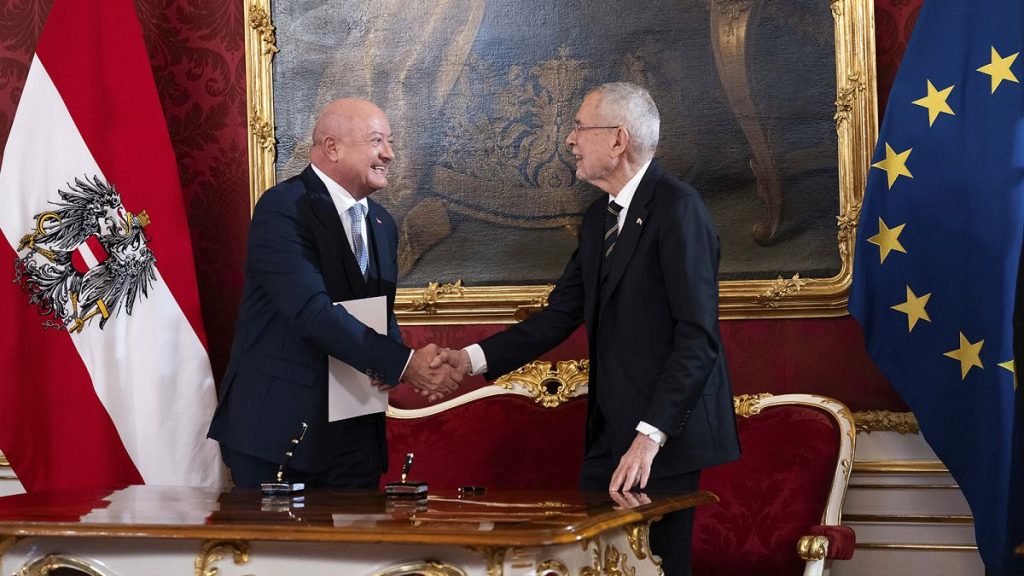Austria’s political landscape has shifted significantly with the recent formation of a new coalition government, following an extensive five-month negotiation period. The coalition brings together three political parties: the centre-right People’s Party (ÖVP), the centre-left Social Democrats (SPÖ), and the liberal Neos. This alliance culminates in the swearing-in of Christian Stocker as the new Chancellor, marking not only a fresh leadership era but also a response to the electoral outcomes that saw the far-right, led by the Freedom Party (FPÖ), being sidelined from power.
| Article Subheadings |
|---|
| 1) Formation of the Coalition Government |
| 2) Profile of the New Chancellor |
| 3) Implications for Austrian Politics |
| 4) The Stance on Key Issues |
| 5) Future Outlook for the Coalition |
Formation of the Coalition Government
The recently established coalition was the product of rigorous negotiations that began after the Austrian elections last September. It took five months for the coalition to reach fruition, marking the longest negotiation period in the country’s history. The parties involved, namely the ÖVP, SPÖ, and Neos, initially faced challenges, as their first attempt to form a government ended in January. However, a breakthrough was achieved last week when the Neos’ grassroots members endorsed the coalition agreement, allowing the three parties to proceed with governance. This coalition comes after the ÖVP’s previous attempts to align with the FPÖ fell flat, resulting in the far-right party being left in opposition.
Profile of the New Chancellor
Christian Stocker, now 64 years old, rises to the role of Chancellor following a trajectory that saw him taking over the leadership of the ÖVP from former Chancellor Karl Nehammer, who resigned amid the coalition breakdown earlier this year. Stocker’s political experience includes serving in the Austrian parliament since 2019 and holding the position of general secretary of the ÖVP prior to his recent appointment. Interestingly, Stocker’s name was not initially a part of the electoral candidates, demonstrating a significant and unexpected turn in Austrian politics. In light of his new role, Stocker expressed surprise at his sudden rise, recalling how he transitioned into his role with very little preparation — “The day the decision was taken, I drove to Vienna in jeans and a roll-neck jumper,” he told a local publication.
Implications for Austrian Politics
The formation of this three-party coalition is historic, representing a shift in Austrian politics from a potential far-right dominance to a more centrist and left-leaning governance structure. The coalition signifies a collaborative effort to establish political stability and governance, particularly as the country has been trying to navigate various domestic and international challenges. With the FPÖ, which received 28% of the vote, now in opposition, the coalition members are poised to implement their agenda. This alliance raises questions about how the power dynamics will evolve in Austria, especially considering the FPÖ’s previous influence and the new government’s approach to pressing issues such as immigration, social policy, and economic stability.
The Stance on Key Issues
The coalition agreement introduced various policy initiatives that importantly signal the government’s direction. Among these policies are stricter measures concerning asylum seekers, a revision of tenancy laws, and planned cuts to social benefits. These decisions reflect shifting priorities in addressing Austria’s socio-economic landscape while maintaining a tough stance on immigration issues. The coalition, particularly under Stocker’s leadership, aims to balance the need for compassion in humanitarian matters with the necessity of protecting Austria’s borders while fostering a conducive atmosphere for economic growth.
Future Outlook for the Coalition
As the new coalition embarks on its governance journey, the focus will be on delivering on the commitments laid out during negotiations. Observers will keenly watch for the coalition’s efficiency in tackling challenges such as inflation, housing shortages, and public health, all of which have been pressing issues for Austrians. The success or failure of Stocker’s administration may also be determined by its ability to maintain unity among the coalition partners and mitigate any potential dissent within, as coalition governments often face internal challenges. The consistent public support for the agreement, as indicated by grassroots backing, will also be a crucial element in solidifying the coalition’s legitimacy and stability in coming months.
| No. | Key Points |
|---|---|
| 1 | Austria’s new coalition government comprises the centre-right ÖVP, the centre-left SPÖ, and the liberal Neos. |
| 2 | Christian Stocker, formerly the party’s secretary, has been appointed as the new Chancellor. |
| 3 | The coalition successfully reached an agreement after the first negotiation efforts stalled earlier this year. |
| 4 | The coalition will implement measures focusing on tougher asylum rules and cuts to social benefits. |
| 5 | Political stability and effectiveness will be critical as the coalition faces both internal and external challenges. |
Summary
The establishment of this new coalition government in Austria represents a pivotal moment in the country’s political journey, setting the stage for progressive governance in the face of significant challenges. With Christian Stocker at the helm, the coalition stands as a counterbalance to the prominence of the far-right in recent elections. Monitoring the dynamics within the coalition and its effectiveness in implementing reforms will be crucial for both domestic policy and Austria’s international relations moving forward.
Frequently Asked Questions
Question: Why did it take a long time to form the coalition government?
The coalition negotiations lasted five months due to differences in party platforms and priorities, requiring extensive discussions to reach a consensus among the involved parties.
Question: What impact does the coalition have on the Freedom Party (FPÖ)?
The FPÖ, which emerged as a significant electoral force, is now in opposition, impacting its ability to influence national legislation and policy decisions.
Question: What are some key policy areas the new coalition plans to address?
The coalition aims to focus on stricter immigration policies, revisions to tenancy laws, and potential cuts to social spending as part of their governance agenda.
